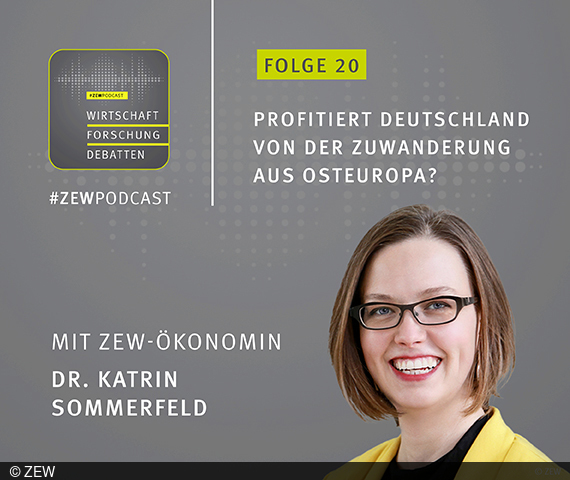Does Germany Benefit from Immigration from Eastern Europe?
#ZEWPodcastZEW Economist Dr. Katrin Sommerfeld in the #ZEWPodcast
The EU eastward enlargements represent the largest ever expansion of European labour markets, which have opened up to more than 102 million Eastern Europeans as a result of the EU’s fundamental right to free movement of workers. 18 years after the first enlargement, ZEW economist Dr. Katrin Sommerfeld takes stock in the latest episode of the #ZEWPodcast ‘Wirtschaft · Forschung · Debatten’/‘Economy · Research · Debates’. She also explains how Germany can continue to benefit from Eastern European workers in the future.
Employees from the so-called EU-8 and EU-2 countries work most frequently in the postal and warehousing industry (170,000 employees), as drivers in road transport (107,000) and in cleaning (102,000), according to the results of a ZEW expert brief published in April. Co-author Sommerfeld explains in the podcast that in recent years there has been a large increase in employment especially in the warehousing industry. “From 2000 to 2010, the share of foreign employees subject to social insurance contributions in Germany was relatively constant at around 6.5 per cent, after which it grew strongly, namely to 12.9 per cent in 2020,” says the economist.
Swift recognition of foreign qualifications and professional experience important
In addition, employees from the new EU countries often work in occupational fields where there are shortages of skilled workers: 43 per cent of Eastern European employees work in occupations where skilled workers are strongly needed, while this is only true for about 32 per cent of Germans. “This is an indication that people from Eastern Europe work disproportionately often in occupations with skilled labour shortages and thus tend to contribute to relieving the German labour market,” says Sommerfeld. In order to ensure that people stay in the German labour market in the medium and long term, the economist believes that it is necessary to give people development prospects. “This does not seem to be the case in sectors that have low skill requirements,” Sommerfeld warns. She appeals to policymakers that, “We need to think about how the recognition of foreign degrees can be implemented as quickly as possible and how work experience can also be acknowledged as a qualification.”
In order to be able to better evaluate political measures in the future, the economist also believes that it is important to build up a better database – so that scientific evaluation of other forms of employment, such as secondments or self-employment, can also be improved. “Especially in the area of home care, the data situation is very poor,” criticises Sommerfeld.


